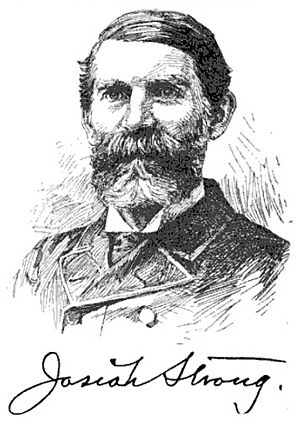Josiah Strong facts for kids
Josiah Strong (born April 14, 1847 – died June 26, 1916) was an American Christian leader, writer, and organizer. He was a key figure in the Social Gospel movement. This movement encouraged Christians to work for fairness and to fix problems in society. Strong believed in missionary work to help people and introduce them to Christianity. However, his ideas about race and how to convert people are seen as very controversial today. In his 1885 book, Our Country, Strong wrote that people of Anglo-Saxon (English-speaking) descent were a better race. He thought they should "Christianize and civilize" other groups, which he believed would help America's economy and these "lesser races."
Contents
Who Was Josiah Strong?
Josiah Strong helped start the Social Gospel movement. This group wanted to use Christian ideas to solve big problems in society. These problems came from new factories (industrialization), growing cities (urbanization), and many people moving to America (immigration).
Strong worked as the General Secretary for the Evangelical Alliance for the United States from 1886 to 1898. This was a group of Protestant Christian missionary organizations. After leaving this role, he started his own group called the League for Social Service (1898–1916). He also edited its magazine, The Gospel of the Kingdom. Later, this group became the American Institute of Social Service.
Strong's Christian Beliefs
Like many other leaders of the Social Gospel movement, Strong had strong Christian beliefs. He believed in sin and that people could be saved through faith. Strong felt that a deep personal change was needed to bring fairness to society and fight against social wrongs. Even though they sometimes criticized traditional church ways, these leaders saw their work as a way to expand Christian teachings.
His Most Famous Book: Our Country
Strong's most well-known book was Our Country: Its Possible Future and Its Present Crisis (1885). He wrote it to encourage Christian missionary work in the American West. When the book came out, many Christians were already worried about threats to America's future. Strong's book fit into a long tradition of people who saw dangers to "our country."
This way of thinking helped end slavery during the Civil War. However, it also made many northern Protestants overlook the struggles of formerly enslaved people after the war. Historians also suggest Strong's ideas might have encouraged American Protestants to support America's expansion into other lands. He also asked for more missionary work in cities and for peace to end racial conflicts. Strong was one of the first to warn that Protestants, who mostly lived in the countryside, were ignoring problems in cities and among working-class people.
Ideas About Race and Civilization
Strong believed that all people could be improved and brought to Christianity. In the "Possible Future" part of Our Country, Strong focused on the "Anglo-Saxon race." He meant people who spoke English. He said in 1890 that this group had grown from less than 6 million people in 1700 to over 120 million by 1890.
Strong believed this group had a duty to "civilize and Christianize" the world. This meant sharing their technology and Christian faith. In 1893, Strong even suggested that this "race" was meant to take over weaker groups, blend with others, and change the rest until it had "Anglo-Saxonized mankind."
Strong argued that "The Anglo-Saxon is the representative of two great ideas... civil liberty... and... pure spiritual Christianity." He believed that because Anglo-Saxons represented these two important ideas, they had a special role in the world's future. He felt they were "divinely commissioned" to be "his brother's keeper."
The "Seven Perils"
The "Crisis" part of Strong's book described seven "perils" or dangers facing the nation. These included:
- Catholicism (the Catholic Church)
- Mormonism (the Mormon faith)
- Socialism (a political and economic idea)
- Intemperance (drinking too much alcohol)
- Wealth (too much power held by the very rich)
- Urbanization (the growth of cities)
- Immigration (people moving to America)
In contrast, some conservative Protestants believed missionaries should only focus on preaching. They allowed for charity but thought it didn't actually save souls.
In 1891, a new version of the book came out, based on the 1890 U.S. Census. The large increase in immigration during that time made Strong believe that the dangers he had written about earlier had only grown worse.


